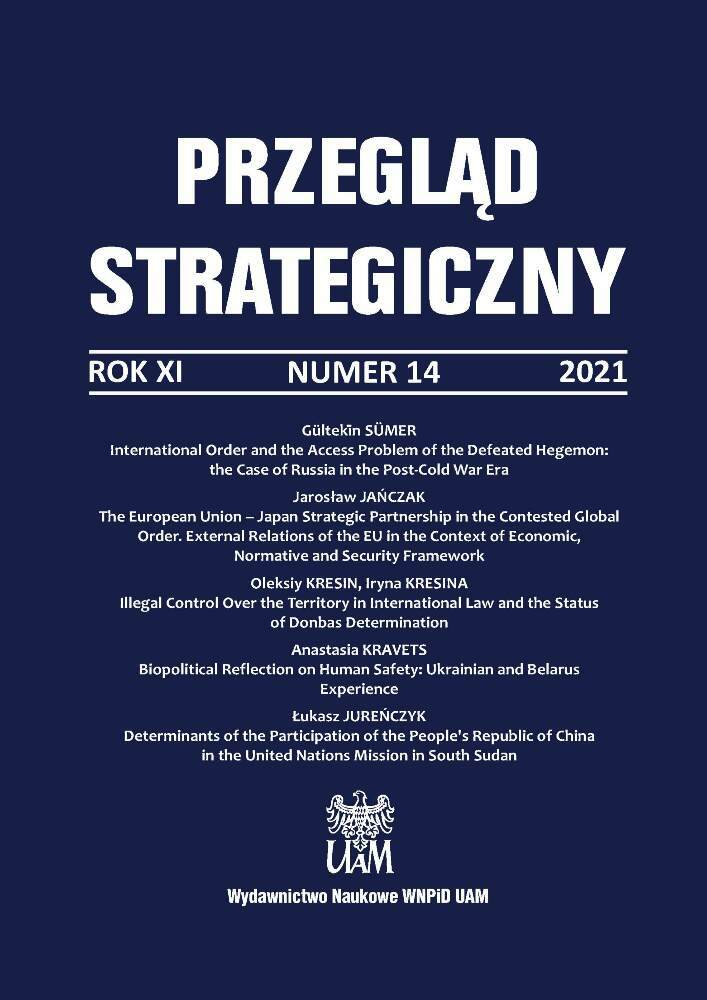Abstrakt
Jedną z głównych cech transformacji postsowieckiej było odrodzenie religijne. Celem tego artykułu jest analiza postsowieckiego odrodzenia islamu w latach 90. XX wieku. Przebudzenie islamu i poszukiwanie miejsca dla muzułmanów w społeczeństwie znacząco wpłynęło na ukształtowanie się dzisiejszej Federacji Rosyjskiej. Autorzy badają czynniki, które wpłynęły na rolę islamu w nowo powstałej postsowieckiej Rosji oraz reakcję władz federalnych na powstałą dynamikę zmian. Artykuł podzielony jest na dwie części. Pierwsza część dotyczy odrodzenia islamu po rozpadzie Związku Radzieckiego. Drugi rozdział koncentruje się na reakcji Kremla na nowe radykalne ruchy, które pojawiły się w okresie przebudzenia islamu i nastrojów separatystycznych w muzułmańskich regionach Rosji. Posługując się jakościową metodą badawczą, autorzy doszli do wniosku, że radykalizację islamską w postsowieckiej Rosji spowodowało kilka czynników zewnętrznych i wewnętrznych. Wydarzenia polityczne w Federacji Rosyjskiej od drugiej połowy lat 90. do początku XXI w. charakteryzowały ograniczenia wolności wyznania i utrwalenie federalizmu.
Bibliografia
Akhmetova E. (2013), Islam in Russia: Historical Facts and Modern Developments, Kuala Lumpur.
Alexseev M. A., Zhemukhov S. N. (2017), Mass Religious Ritual and Intergroup Tolerance: The Muslim Pilgrims’ Paradox, Cambridge.
Arnold V. (2012), The place(s) of Islam in Soviet and post-Soviet Russia, in: Soviet and Post-Soviet Identities, (eds.) M. Bassin, C. Kelly, New York.
Bobrovnikov V. (2001), Post-Socialist Forms of Islam Caucasian Wahhabis, “ISIM Newsletter”, Vol. 7, No. 1.
Bobrovnikov V. (2006), Religious Culture In Dagestan: From Socialist To Islamic Revolution?, “Russian Cultural Review”, Vol. 9.
Bobrovnikov V. (2006), The Wahhabites In The North Caucasus: Fears And Realities, “Russian Cultural Review”, Vol. 9.
Decree of the President of the Russian Federation N. 168 on March 21, 2014 “On the formation of the Crimean Federal District”.
Decree of the President of the Russian Federation N. 849 on May 13, 2000 (as amended on 13.12.2018) “On the Plenipotentiary Representative of the President of the Russian Federation in the Federal District”.
Falkowski M. (2016), Russia’s ‘Middle East’: the escalation of religious conflicts in the Northern Caucasus, “OSW Commentary”, No. 207.
Federal Law of the Russian Federation N. 114-FZ Of 25 July 2002 “On Countering extremist Activity”.
Federal Law of the Russian Federation N. 125-FZ Of September 26, 1997 “On The Freedom Of Conscience And Religious Associations”.
Halbach U. (2001), Islam in the North Caucasus, “Archives de sciences sociales des religions”, Vol. 115, https://doi.org/10.4000/assr.18403.
Hunter S. (2004), Islam In Russia: The Politics Of Identity And Security, London–New York.
Iliyasov M. (2020), Radicalisation and Resilience Case Study: Russia, The GREASE project, http://grease.eui.eu/wp-content/uploads/sites/8/2020/10/WP4-Report_Russia-1.pdf.
Malashenko A. (2003), Dva neskhozhikh renessansa [The two different Renaissances], „Отечественные записки” [The Domestic notes], Vol. 5, No. 14.
Malashenko A. (2015), Islamic Challenges to Russia, From the Caucasus to the Volga and the Urals, in: Putin’s Russia: How It Rose, How It Is Maintained, and How It Might End, (eds.) L. Aron, Washington.
Mchedlova M. M., Kofanova E. N. (2020), Russia in Anticipation of Changes: Religious Factor and Socio-political Preferences, “RUDN Journal of Political Science”, Vol. 22, No. 1, https://doi.org/10.22363/2313-1438-2020-22-1-7-21.
Merati S. E. (2017), Muslims in Putin‘s Russia: Discourse on Identity, Politics, and Security, Cham.
Moukhariamov N. M. (1997), The Tatarstan Model: A Situational Dynamic, in: Beyond the Monolith: The Emergence of Regionalism in Post-Soviet Russia, (eds.) P. J. Stavrakis, J. DeBardeleben, L. Black, Washington–Baltimore–London.
Ramet S. P. (1993), Religious policy in the Soviet Union, New York.
Sweet J. (2016), From the Post-Soviet Godless Legacy to Radical Islam: Russian Converts, “Global Security Studies”, Vol. 7, No. 1.
The Law of the Ingush Republic, “On the Ban of Wahhabi and Other Extremist Activities on the Territory of Ingush Republic”, 1998.
The Law of the Republic of Dagestan, “On Banning Wahhabi and Other Extremist Activities on the Territory of the Republic of Dagestan”, 1999.
The Law of the Russian Soviet Federative Socialist Republic from October 25, 1990 N. 267-1 “About the Religious Freedom”.
The Law of the USSR from October 1, 1990 N. 1689-1 “About the Freedom of Conscience and Religious Organizations”.
Treaty Between the Russian Federation and the Republic of Tatarstan “On Delimitation of Jurisdictional Subjects and Mutual Delegation of Powers between the State Bodies of the Russian Federation and the State Bodies of the Republic of Tatarstan”, 15.02.1994.
Trenin D. V., Malashenko A. (2004), Russia‘s restless frontier: The Chechnya factor in post-Soviet Russia, Washington.
Tsygankov A. P. (2016), Russia’s Foreign Policy: Change and Continuity in National Identity, Lanham–Boulder–New York–London.
Wilhelmsen J. (2005), Between a Rock and a Hard Place: The Islamisation of the Chechen Separatist Movement, “Europe – Asia Studies”, Vol. 57, No. 2.
Yemelianova G. M. (2002), Russia and Islam: A Historical Survey, Hampshire–New York.
Yemelianova G. M. (2010), Radical Islam in the Former Soviet Union, London–New York.
Yemelianova G. M. (2016), Muslim-State Relations in Russia, in: Muslim Minority-State Relations, (eds.) R. Manson, Hampshire–New York.
Zhemukhov S. N. (2018), The North Caucasus: How Islam and Nationalism Shaped Stability and Conflict in the Region, in: Religion, Conflict, and Stability in the Former Soviet Union, (eds.) K. Migacheva, B. Frederick, Santa Monica.

